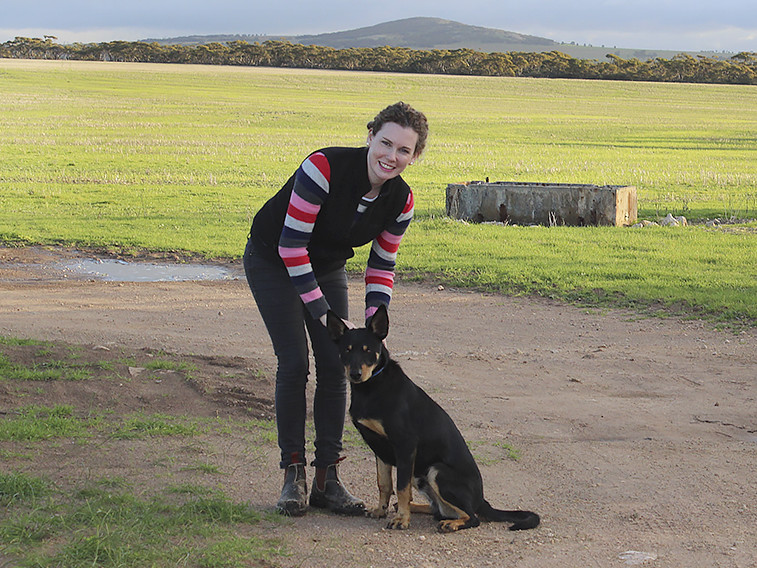Confidence continues to lift


Insight
Researchers are seeking help from farmers around Australia to test and advise on a new online resource designed specifically to help farmers better cope with the challenges of their occupation.

On the list of challenges in the life of a farmer one of the hardest parts is a lack of control – over things like the weather, disease outbreaks, markets. A new online self-help resource aims to give farmers new tools to better cope with things they cannot easily ‘fix’ or control, and the resulting worry and stress.
Growing up on a farm in one of the most isolated parts of South Australia, Kate Fennell (nee Gunn) saw firsthand the pressures of being a farmer and the toll it can take on people.
After leaving the farm she completed an undergraduate psychology degree, focused her honours year research on the mental health of farmers during drought, then went on to do a masters and PhD, also focused on rural health.
Today Dr Fennell is the lead researcher on the development of a new online wellbeing resource, tailored to farmers and aimed at helping them develop skills to manage stress and successfully cope with the challenges of farm life, particularly things beyond their control.
Dr Fennell says the website is designed not only to help farmers already dealing with mental health issues but also to help to prevent problems developing in the first place.
“We want it to be seen as more of a tool that farmers can use before they feel really distressed, where they can fill up their toolbox with coping skills and prevent the need for more intense mental health treatment,” she says.
The program is being developed in the Sansom Institute for Health Research at the University of South Australia in collaboration with the University of Adelaide, the National Centre for Farmer Health, and the Freemasons Foundation Centre for Men’s Health. The project was kick-started in 2016 with a $100,000 boost from the NAB Foundation, via the NAB Foundation’s 2016 Stronger Minds grant program.
The team is currently working closely with 20 enthusiastic Australian farmers to design the resource. In coming months the website will be made available to Australian farmers who are willing to complete the five short, interactive modules (over approximately 10 weeks) and help with its evaluation.
The team need at least 80 farmers from regions around Australia to be involved in this process, so that they can rigorously test out whether or not the website helps.
Farmers who complete all five of the online modules (approximately 20 minutes each) and the relatively short pre and post questionnaires will be sent a $100 voucher to partly reimburse them for their time and internet-related expenses. Participation will also help the website to be improved for the benefit of other farmers who may need it in the future. Once the evaluation is complete, the resource will be made publically available to anyone who would like to use it.
“We are putting a lot of effort into ensuring this resource is farmer-driven so farmers really feel it’s something they can relate to and that it taps into their sense of humour, language, way of life and sources of stress.
“Of course being sure the website also has the desired effect on users’ wellbeing is also very important, which is why we need some farmers to help test it out,” Dr Fennell said.
The resource will be informed by Acceptance and Commitment Therapy, a psychological therapy that has been used to successfully promote wellbeing in other stressful workplaces and with groups such as cancer patients who also have to deal with uncertainty and unexpected developments.
“I did my first research on farmers’ mental health during the drought in 2008. That was a time when things were pretty bad on the land in many parts of Australia,” says Dr Fennell. “This research helped identify farmers’ exact sources of stress during drought, and the coping strategies that distinguish a farmer who copes effectively from a farmer who ends up experiencing a lot of distress.
“Farmers are already great at problem solving. The things that cause the most distress are those beyond their control – the weather, commodity prices, government regulation, disease outbreaks – and these are challenges they face a lot.
“We found that a farmer who can use humour and, most importantly, acceptance, to cope is more likely to adapt well and not become too overwhelmed by challenges. Exactly how to do that is what we are hoping to teach people via information, videos and interactive exercises on the new website.”
“In many other contexts, problem solving is one of the most helpful coping strategies one can employ, but it makes sense to us that, in the farming context, where the most stressful things can’t simply be ‘fixed’ or ‘solved’, things are different.”
“This is an approach that’s been effective for helping people affected by cancer deal with uncertainty about the possible recurrence of their disease, and work out how to get the most out of life even though their circumstances may be difficult and their opportunities limited. We are confident it will be helpful for farmers as well, but this is the first study designed to test it in the farming population.”
Dr Fennell says it is vital that the look, feel and experience of the site be tailored to farmers.
“Farming is quite a unique occupation,” she says. “Often a farm is both a person’s workplace and home, and their identity is often strongly linked with the success of their farm,” she says.
“I think farmers do feel a bit forgotten and misunderstood by people in the city, as well as by governments and some health professionals. We want to show that there are some people who are bothering to understand and improve their way of life.”
Dr Fennell’s link with her own rural community remains strong with her family continuing to run the family farm.
“Mum and Dad are still there and my brother will eventually fully take over,” she says. “A lot of my family and friends are involved in farming, it’s a group I care about. I love working with country people and I’m pleased to be able to use my personal experience and professional training to try and address these issues.
If you are over 18 years of age, have access to the internet and you or your partner currently play an active role in the operation of a farming or pastoral enterprise in Australia, Dr Fennell and her team would welcome your input. To express your interest in testing out the website, please email farmers@unisa.edu.au or phone 08 8302 1840 for further information.
© National Australia Bank Limited. ABN 12 004 044 937 AFSL and Australian Credit Licence 230686.